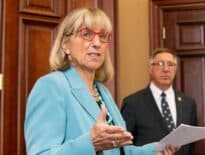State funding will offer incentives for affordable units as Boston extends its office-to-residential conversion incentive program through the end of 2025.
Gov. Maura Healey today announced a pool of $15 million that would give developers $215,000 for each income-restricted unit in office buildings converted into housing.
Boston’s pilot office-to-residential conversion program was set to expire next week. Since its launch in October, developers have submitted nine applications for 412 housing units in the Downtown Crossing, Financial District and South End neighborhoods.
The state incentive program is capped at $4 million per project.
The $15 million for Boston was awarded through the state Affordable Housing Trust Fund. Healey also is proposing $275 million toward commercial-to-residential conversions through the proposed five-year, $4 billion housing bond bill on a statewide basis.
The administration also is offering communities $1 million toward technical assistance related to housing conversions.
Officials said the new incentive is designed to spur larger-scale conversions than already proposed under the Boston program. The largest project submitted to-date includes 95 apartments by KS Partners in three buildings at Downtown Crossing.
Developers now have until Dec. 31, 2025 to submit applications. Approved projects are required to obtain building permits and begin construction by Dec. 31, 2026.
Healey and Boston Mayor Michelle Wu announced the city-state partnership at 95 Berkeley St., where developer CIM Partners proposes 91 apartments including a 20,000-square-foot expansion of the 107,128-square-foot building in South End. The project is estimated at $75 million.
The former warehouse has floor plates ranging from 14,409 to 16,067 square feet. CIM Group bought the property in 2016 for $43 million.
Declining assessments at office buildings with rising vacancies could generate a fiscal crisis in Boston in coming years, prompting a series of policy debates on tax policy and growth strategies.
This month, the Boston city council approved Mayor Michelle Wu’s proposal to shift a larger portion of the property tax levy onto commercial buildings. The proposal also requires legislative approval.
To encourage conversions of office buildings into housing, Boston offers a 75 percent abatement on property taxes for 29 years.
Projects are required to include a minimum 17 percent income-restricted units and another 3 percent reserved for housing voucher holders.
According to an analysis by RentCafe, Manhattan led the U.S. with 733 conversions to apartments in 2023.









